IBDC 2008 Succeeds 12th Time to Reinvent Wheel with Global Design Talents
2008/04/17 | By Quincy LiangWhoever said that reinventing the wheel is redundant obviously has not set eyes on the incredible ingenuity at the prestigious International Bicycle Design Competition (IBDC), whose vision is to groom potential and creative designers, a mission made possible by the throngs of aspiring and seasoned designers spinning their cerebral wheels. The IBDC has been billed as the only global cycle design contest, one known for its innovative, trendsetting submissions, and perhaps more importantly that cycle design has no bounds.
The 2008 version of IBDC or its 12th staging saw the award winners announced on March 13th, the opening day of the Taipei International Cycle Show.
The 2008 IBDC is sponsored by the Department of Industrial Technology (DoIT) of the Ministry of Economic Affairs and organized since 1996 by the CHC (Cycling & Health Tech Industry R&D Center in Taichung, a city in central Taiwan. An international jury of experts from Japan, the Netherlands, Germany, South Korea and Taiwan used a computerized process to judge the design entries in August 2007, with 21 entries selected for the final stage.
Fulfilling its vision, the IBDC has evolved into a renowned global, annual stage on which established and up-and-coming cycling designers may present concepts, compete and, hopefully during the process, come away better informed and more mature; while so far more than 9,000 entries have been proposed by participants from 86 countries. Perhaps unintentionally but still tapping the positive effect of globalization, the CHC aims to integrate worldwide design resources to examine, understand global lifestyles, consumer behavior, and fashion trends. Such focus ideally inspires the cycle design community to not only adopt a bird's eye view, but also take into account the practicalities, such as devising double-decker bike racks for high-density population areas, to come up with creative, better ideas.
Design competitions very often are a perfect window on the future and show the shape of things to come, a Dutch juror stressed. The IBDC is a premier design competition in the bicycle trade.
The international jury, made up of professionals from Japan, the Netherlands, Germany and six well-known industry experts in Taiwan, certainly did not have their work cut out for them when deciding on the finalist, who amazed the panel with entries that showed out-of-the-box thinking on multi-functionality and no-nonsense practicality. Some bicycles feature entertaining value, while others are equipped with amphibious devices, designed specifically for shopping or children; and there is anti-theft-device-integrated frame; 3C-enabled bikes; electric folding bikes; as well as cycles that double as single-seat or tandem mode. The huge variety of designs show that bicycles are much more than two-wheeled, pedal-powered transport.
2008, Exciting Year for Cycling
Han Goes, IBDC juror, pointed out that 2008 has the potential to become very exciting for the international bicycle sector for various reasons, one of which is that local and national authorities in Europe are embracing bicycle as a transport solution to many problems: pollution, traffic jam, parking and obesity. Regardless of how fancy a bicycle, it continues to ride on unmatched advantages of being green, relatively cheap and compact.
Besides being fueled for the above reasons, cycling has developed renewed and massive consumer interest, Goes said; but this interest has an added motivation: the average Mr. and Mrs. Consumer are looking for new, added cycling functionality.
Over the last 20 years, performance products (mainly mountain bikes and to a lesser extent road racing cycles) have heavily steered the direction of product development and conception in the bicycle sector, the juror observed.
But the fact is that most cyclers do not mountain bike or race. On the contrary, the European market is screaming for rental bikes, electric bikes, compact folding bikes and ones to carry more things, riders comfortably and easily etc.
Performance Cycles No More
Looking at the last 10 years of the IBDC contests, Goes said, one can see two clear trends: The first is that performance bicycles (mountain and road racing bicycles) have nearly disappeared as entries; while the second is that conceptual design is prevailing over "design for the sake of design."
Goes said that, in the past five years, the IBDC has achieved unprecedented level of quality and innovation, which is why it has become increasingly the hotbed for the latest trends and inspirations in the industry.
Award-winners
The DIT editorial team, in the following, spotlights 11 of the 19 award winners in this year's IBDC (including the top-three winners), whose judges originally chose 21 finalists, but two eventually did not compete in the final stage.
Award: Grand Prize
Concept Name: SUNNY DAY
Country: Taiwan
Designer: Larry Chen
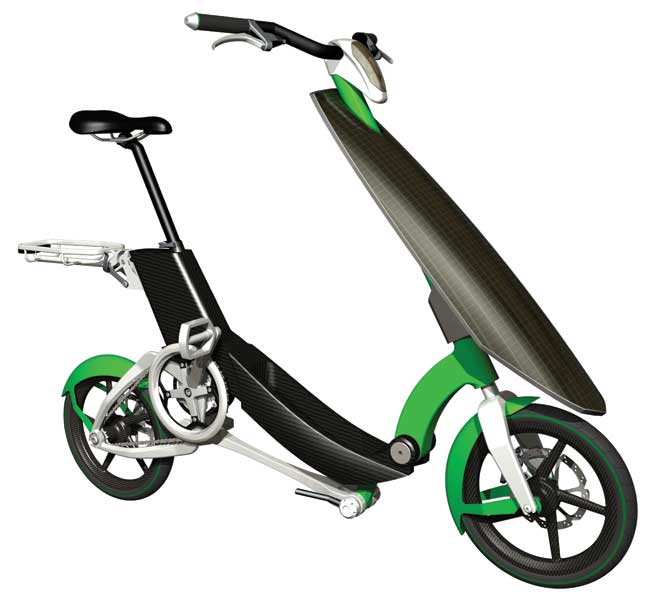
A solar-powered electric bicycle, Sunny Day features front-mounted, streamlined solar panel for better aerodynamics, with, while parked, the photo-sensitive-synchronized system actuating the solar panel to face upward for continual power storage.
Award: Second Prize
Concept Name: SVEPA
Country: Sweden
Designer: Par Blanking
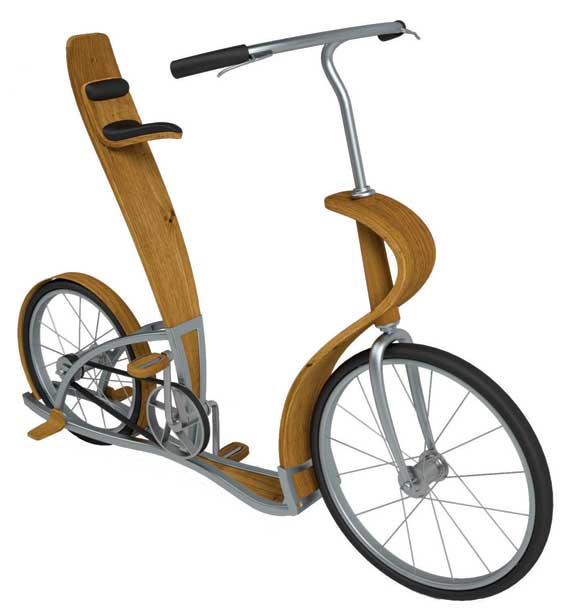
A simple and comfortable urban bicycle, SVEPA is a tandem cycle that enhances the fun of mobility. Decorated in timber motif, its frame touts the concept of zero-pollution and eco- friendliness, as well as providing a creative and eco-educational way to urban cruising.
Award: Third Prize
Concept Name: EVERGLIDE
Country: Australia
Designer: Frag Woodall
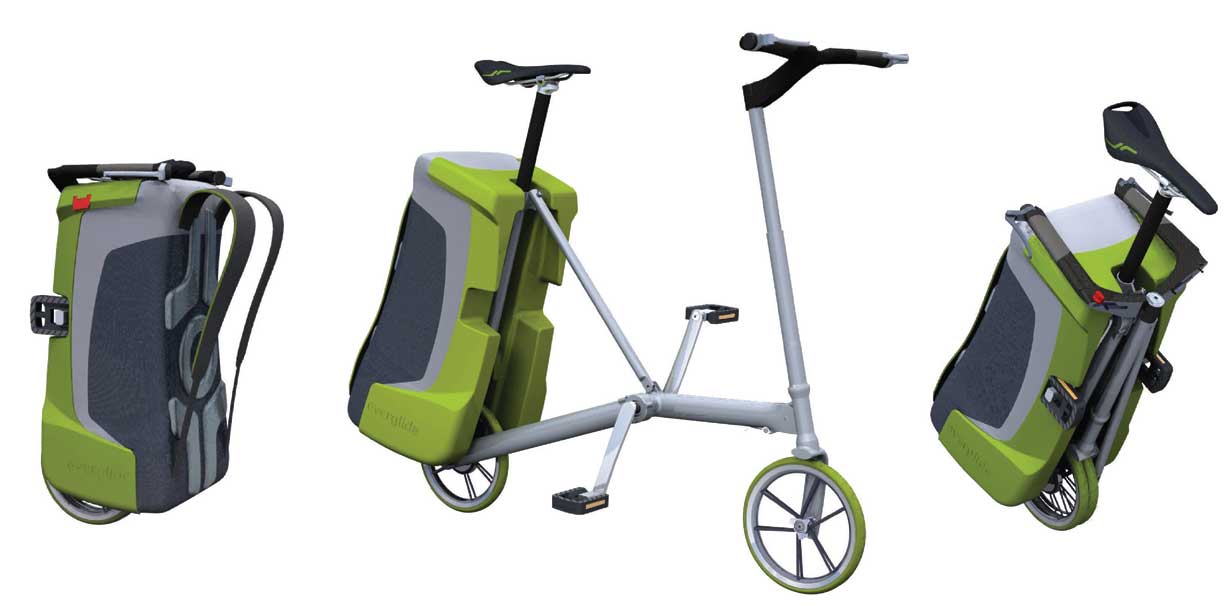
EVERGLIDE is an innovative design that literally turns a short-distance cycle into a backpack. Able to be folded into a backpack, Everglide is a packable cycle that is easily carried as a backpack, making for an ideal personal transport for downtown residents who commute a kilometer or so to work, as example.
Award: Excellent Prize
Concept Name: TWO.U.BIKE
Country: Taiwan
Designer: Chung-bi Lee
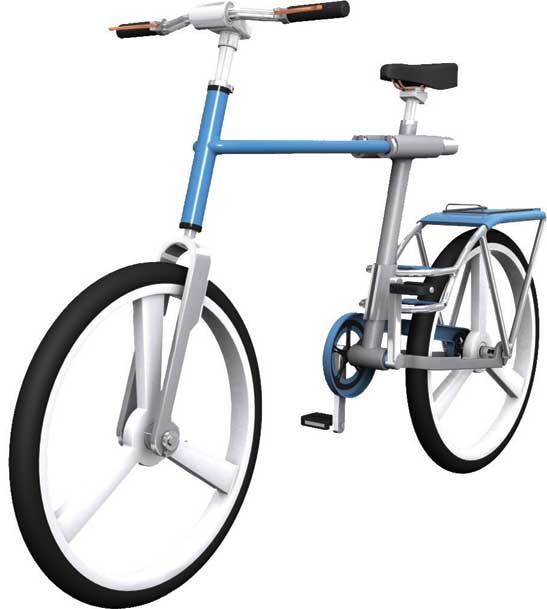
Designed for added convenience, TWO.U.BIKE features an integrated "lock" as well as brand-new parking system. Effectively reducing potential thefts, this bicycle also does its key task admirably: offering personal transport ecologically to raise quality of life.
Award: Excellent Prize
Concept Name: LOHAS BIKE
Country: Taiwan
Designer: Wei-ping Chen
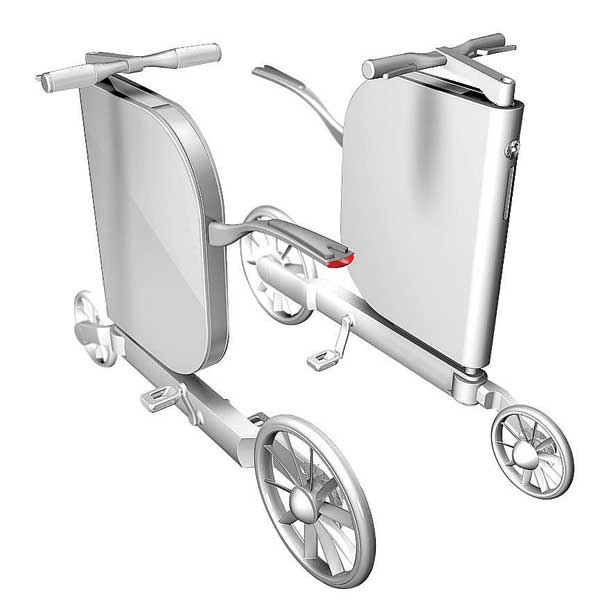
Specially designed for riders who are eco-minded, LOHAS BIKE features simple, streamlined styling and hybrid tech. Generating power for its battery via pedaling and its windmill-designed wheel, this bicycle also can power up various small electronic devices, doubling both as personal transport and green power source.
Award: Excellent Prize
Concept Name: FREE LOCK
Country: South Korea
Designer: Bong Ho Kuen & Ko Youn Jung
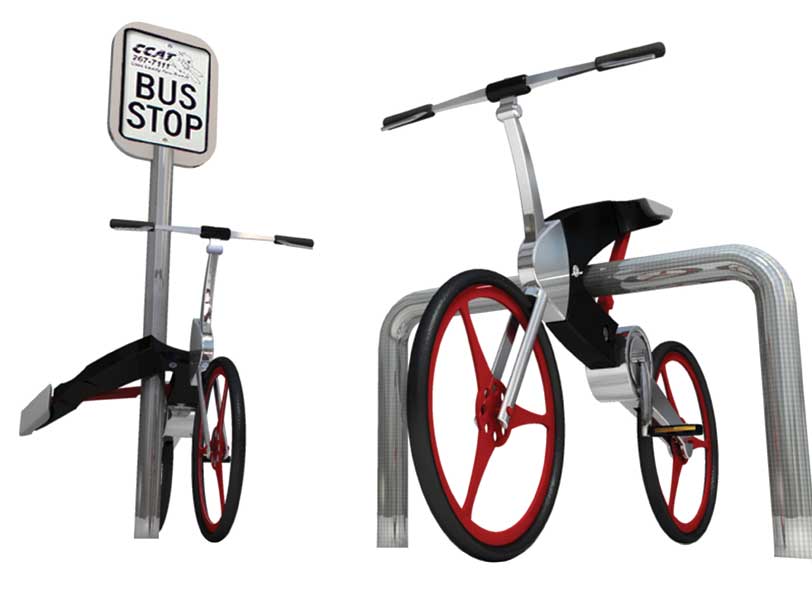
Perfect for unsafe areas, FREE LOCK features an innovative anti-theft solution, with the frame and saddle being able to be ingeniously turned into a lock, sparing cyclists the hassle of having to pack locks. The best part is that FREE LOCK works on all kinds of fences, railings or poles typically found in cities.
Award: Excellent Prize
Concept Name: OMEGA
Country: Puerto Rico
Designer: Ramon Luis & Rodriguez Ruiz
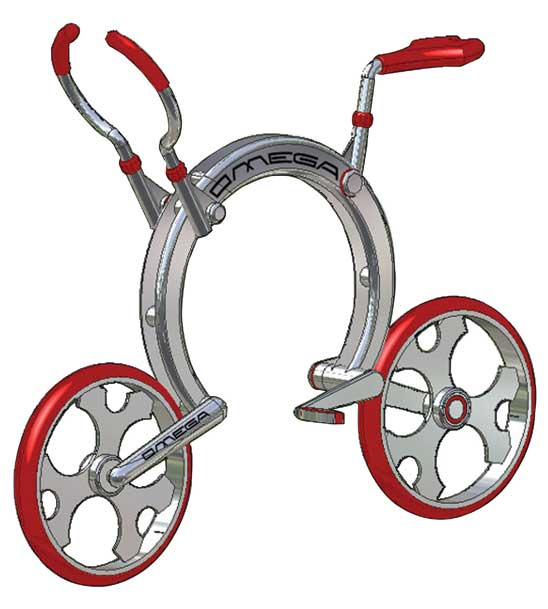
OMEGA is a foldable bicycle that is especially designed to be carried onto public transits as buses and trains. It is extremely compact with wheels being able to be folded, tucked into the frame; while its stylish frame design actually is attractive enough to be ornamental in any space.
Award: Merit Prize
Concept Name: ACHETEUSE
Country: Taiwan
Designer: Shang-kuei Tai
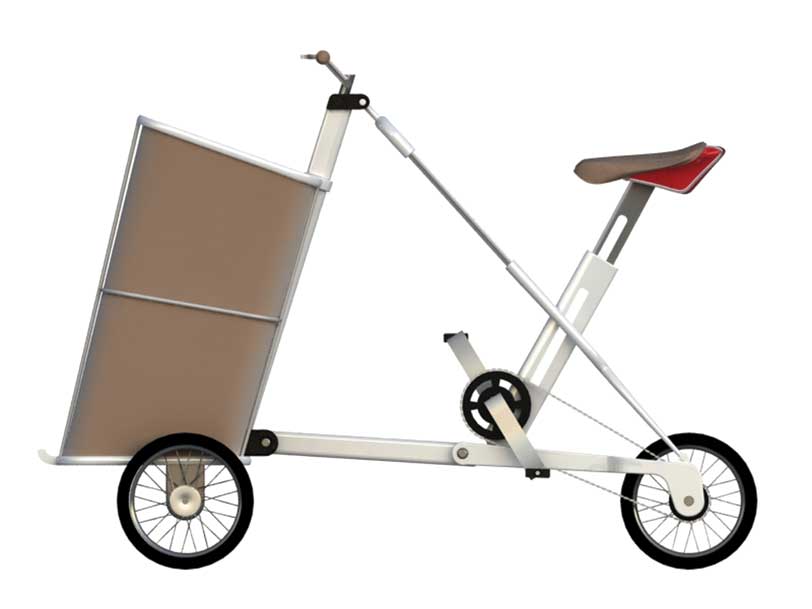
Solving the problem of toting heavy loads from shopping, Acheteuse is lightweight and extra stable for being a tricycle. Now women shoppers can ride and securely carry goods in the spacious front storage afforded by the tricycle design, with the foldable feature further enhancing the overall convenience of shopping errands.
Award: Merit Prize
Concept Name: COMBIKE
Country: Taiwan
Designer: Li-ru Lai & Fen-ju Lin
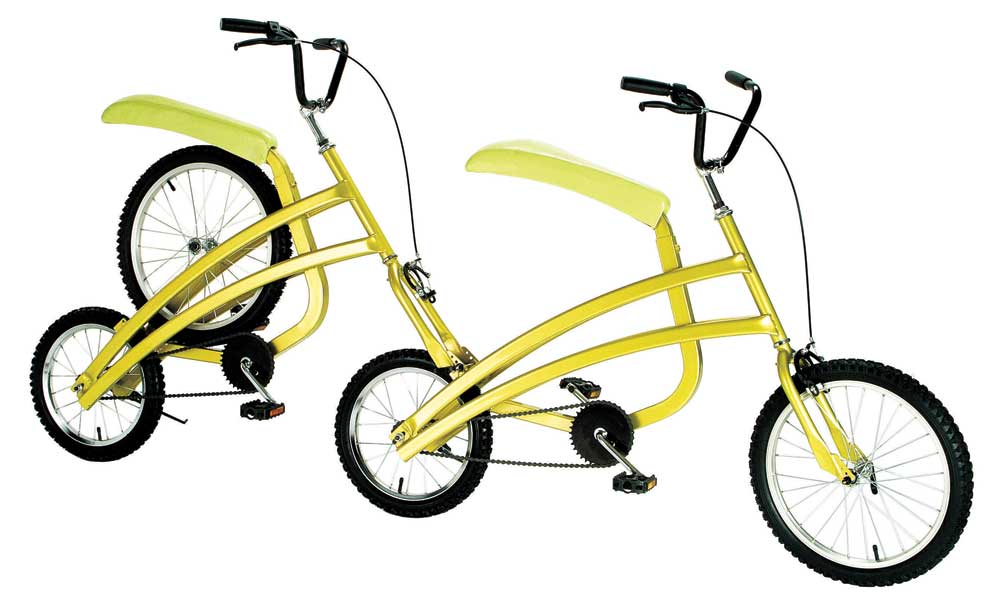
Literally a bicycle with dual personalities, COMBIKE allows a rider to use a simple device to turn a single-seat cycle into a tandem bike by joining two parts-hence giving riders multi-functionality convenience, as well as overcoming storage problems related to keeping tandem bikes for single riders.
Award: Merit Prize
Concept Name: DISCOVERY
Country: Taiwan
Designer: Yao-sheng Liu
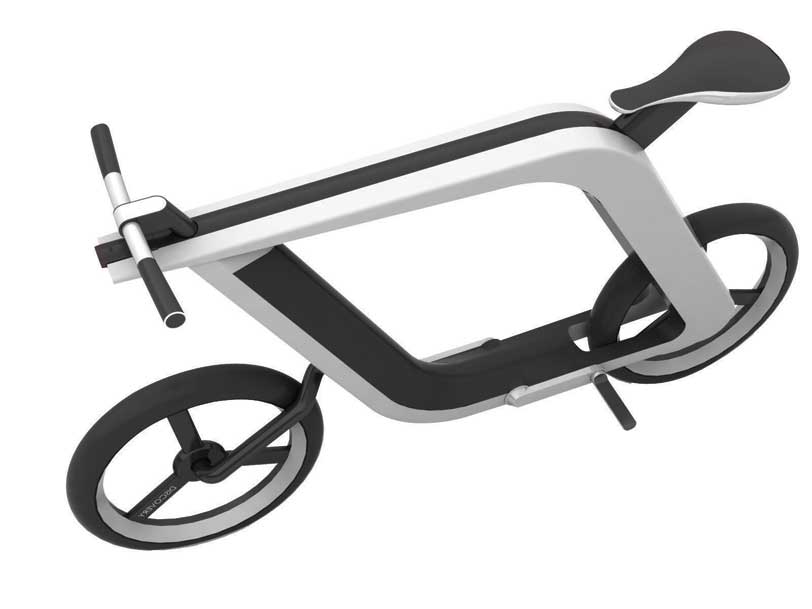
Readily recognizable for its slim, diamond-shaped frame, DISCOVERY integrates all the drivetrain, brakes and lights within the innovative chassis; while its detachable front light doubles as a flashlight if needed. This bicycle is especially noteworthy for having ultra-clean lines.
Award: Merit Prize
Concept Name: FROGG
Country: Taiwan
Designer: Hung-yi Lin
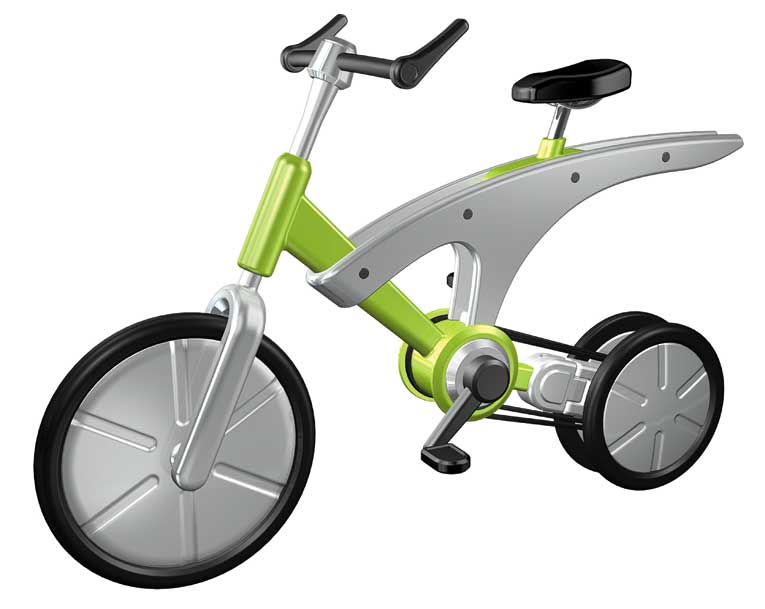
Designed with an eye on added stability, FROGG is not only suitable for general daily commuters, but also, with adjustable inter-rear-wheel distance, is especially practical on slippery terrain with a three-point contact rather than two; while the integrated, spacious storage box enhances its convenience.

